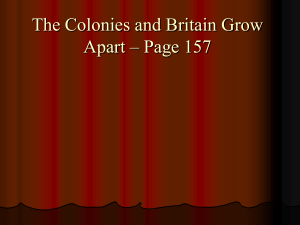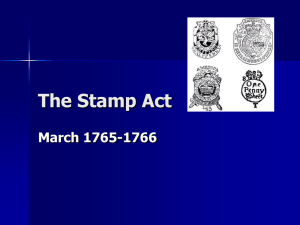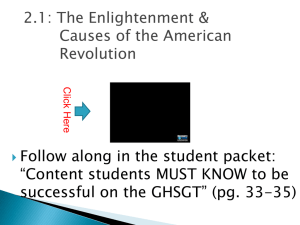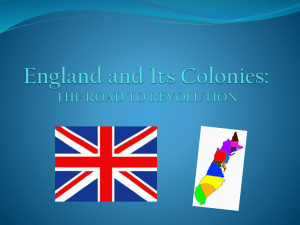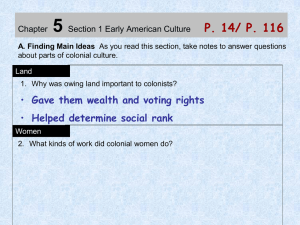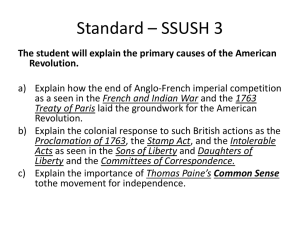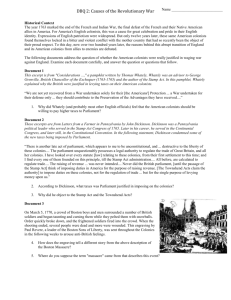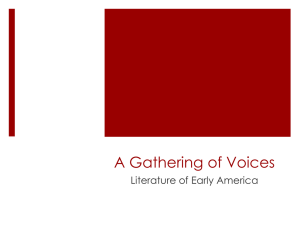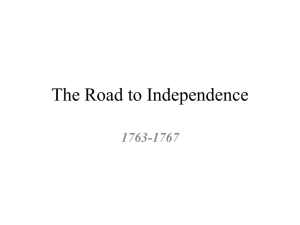Taxation Without Representation - vincentcorrado
advertisement
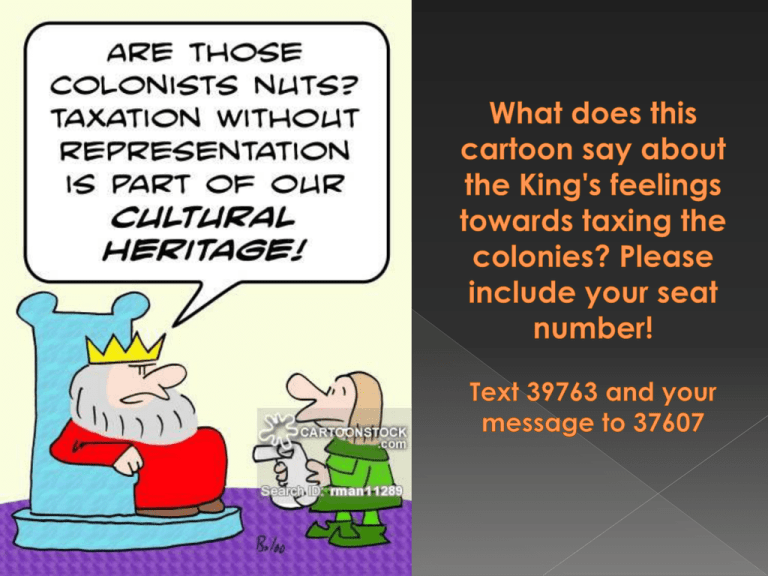
Post French & Indian War › Britain controlled Canada, NA to the Miss. River, and Caribbean › Proclamation of 1763- prohibited colonists from moving west of App. Mts. Advantages for Britain Allowed crown, not colonists to control expansion west Orderly Conflicts w/ natives maybe avoided Slow colonists moving away from colonies Important markets have more labor for more product Allow crown to control lucrative fur trade Alarmed colonists Felt ‘Red Coats’ there to restrict them Take away liberties Restrict their freedom Lead to feeling of distrust Financial Problems for Britain War put into huge debt Need revenue, or incoming money Felt only fair colonists should pay part 1763- George Grenville becomes Prime Minister › Determined to reduce Britain’s debt › Take action against colonial smuggling Smuggled goods avoided taxes Could be used to reduce debt › Colonial juries often found smugglers not guilty › 1763- Passed law saying smugglers sent to English courts instead › 1767- authorized “writs of assistance” Legal documents allowing Brits to search any location for smuggled goods Even their homes! Grenville tries to increase tax revenue 1764- passes Sugar Act › Lowered tax on imported molasses › Hoped lower tax encourage colonists to pay tax rather than smuggle › Also allowed Brits to seize goods from smugglers w/o going to court New laws angered colonists › Rights as Englishmen being violated Writs of Assistance violated right to secure their homes British courts violated right to trial by jury Guilty until proven innocent Contradicted British law Innocent until proven guilty 1765- pass the Stamp Act › Placed tax on all printed materials › Newspapers, pamphlets, wills, cards, etc. had to have stamp on it Put on by British officials › So many items taxed, convinced colonists they must act Why taxes wrong… › Interfered in colonial affairs by taxing directly › Taxed colonists w/o consent › No consultation w/ colonial legislatures Patrick Henry, member of Virginia House of Burgesses › Convinces them to act › Pass a resolution, or formal expression of opinion against British tax Only colonial legislature have right to tax colonies Sam Adams in Boston starts “Sons of Liberty” › Took to streets to protest Stamp Act › People in other colonies did the same › Burned effigies Rag figures representing tax collectors › Raided and burned homes of royal officials › Marched in the streets Oct. 1765- delegates from 9 colonies meet in New York › Stamp Act Congress Draft letter to King and Parliament Declares only colonial legislatures can tax colonies Colonials begin to boycott › To refuse to use, or buy British goods › Signed nonimportation agreements Pledge not to buy British imported goods › Spreads throughout colonies › British merchants begin to lose so much money they beg Parliament to repeal, or cancel the Stamp Act March 1766- Parliament repeals Stamp Act › Whoo Hoo!! › Colonists win battle, but war far from over Same day though passed another Act The Declaratory Act of 1766 › Says Parliament has right to tax and make all decisions regarding British colonies Parliament passes Townshend Acts › Applied taxes only on imported goods › Goods taxed were basic necessities though › Had to import them b/c couldn’t produce them Glass, tea, paper, lead, etc. Colonists outraged!!! › Bring back the boycotts › Even more widespread this time

